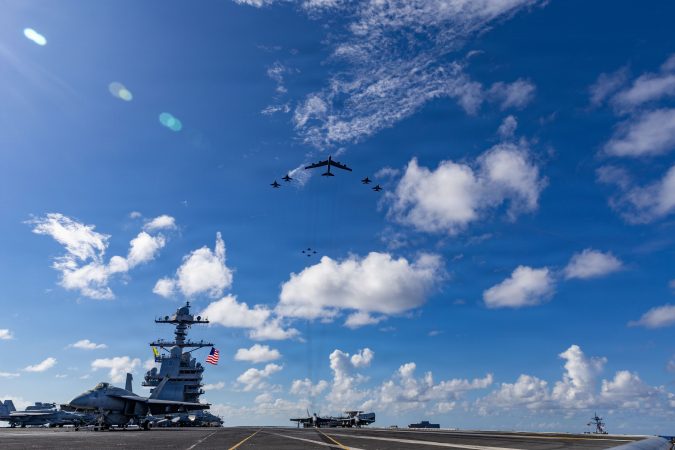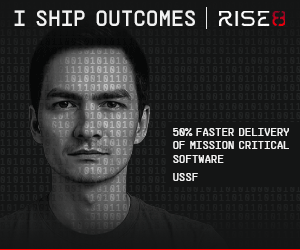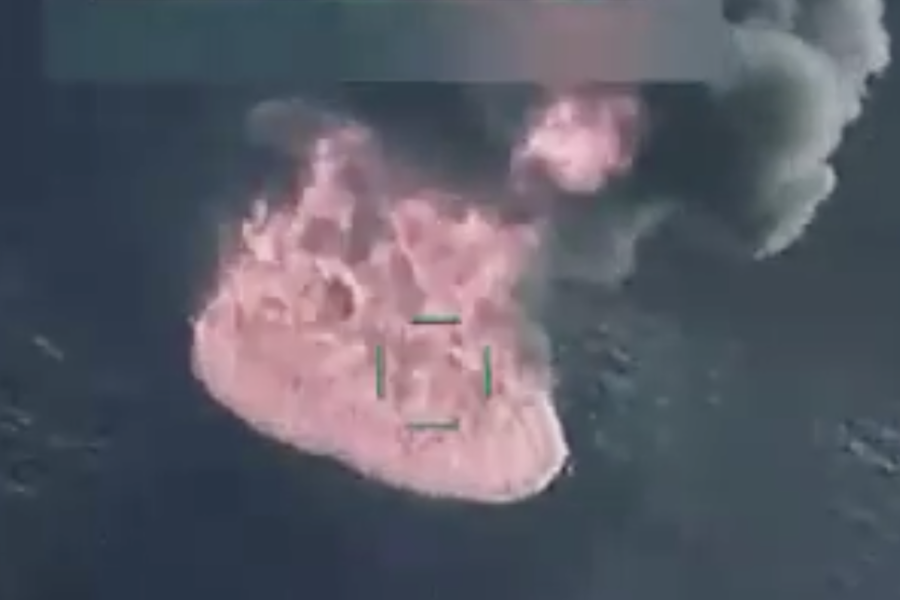The sinking of 21 boats and killing of dozens of accused “narco-terrorists” by the Trump administration over the past two months has sparked an intense debate among legal experts and lawmakers.
The Trump administration asserts the President’s authority to order the strikes in a classified legal opinion drafted by the Department of Justice’s Office of Legal Counsel. Details about the specifics of that opinion have not been shared publicly.
Following an Oct. 1 classified briefing to the Senate Armed Services Committee, Chairman Sen. Roger Wicker (R-Miss.) and Ranking Member Sen. Jack Reed (D-R.I.) wrote to Secretary of Defense Pete Hegseth requesting “additional information … with respect to the legal and policy underpinnings and other aspects of these operations” including “any written opinion issued by the Department of Justice’s Office of Legal Counsel opining on the domestic or international legal basis for these operations.”
Also in October, Charles L. Young III—nominated to serve as general counsel for the Department of the Army and acting general counsel for the Department of Defense at the time the opinion was being written—told the committee the administration’s justification “was derived through an interagency lawyers working group with the CIA, the State Department, White House counsel, Department of Justice, Department of Defense general counsel.” Young also said “the Chairman’s legal uniformed judge advocates were part of that decision.”
Left unclear is what, if any, role the military services’ top judge advocates general, or TJAGs, may have played. The Department of Justice deferred to the Pentagon when asked, and a Pentagon spokesperson said only that the department’s general counsel and legal advisor to the Chairman of the Joint Chiefs of Staff were “consulted.”
The role of TJAGs has been under scrutiny since Hegseth dismissed the Air Force and Army TJAGs in February, just a month after being sworn in as Secretary. “We want lawyers who give sound constitutional advice and don’t exist to attempt to be roadblocks to anything—anything that happens in their spots,.” Hegseth said at the time.
Hegseth’s 2024 book, “The War on Warriors,” is critical of military lawyers who he sees as having held back the nation’s warfighters in combat. When President Trump signed an executive order enabling the Pentagon to adopt Department of War as an alternative name, Hegseth explained the name change is part of a culture shift in search of “maximum lethality—not tepid legality. Violent effect, not politically correct.”
Hegseth’s dismissal of the TJAGs left those jobs vacant for months, worrying some legal observers that the role of JAGs as legal advisors would be diminished. The Air Force TJAG job remains vacant even now, nine months later.
A retired Air Force senior Judge Advocate General told Air & Space Forces Magazine that TJAGs do not expect to be involved in high-level administration policy. Their role is more about implementing policy than formulating it.
“If a narcoterrorist is a quote-unquote ‘legitimate terrorist designation,’ the JAGs would have very little input into that,” the retired official said. “That’s really a policy question that comes from the administration. OLC, DOJ would be intimately involved in making that determination.”
But another retired senior military lawyer said that while it is “not unusual” for the Office of Legal Counsel to act without consulting the TJAGs, such consultations can be valuable because TJAGs can lend valuable perspectives and “experience in law of war and targeting—that’s what we do.”
An Armed Conflict
Articles I and II of the Constitution grant Congress the power to declare war, but reserve for the President the role of the commander-in-chief of the military. How the President wields that power has changed over the past quarter century. The War Powers Resolution, passed by Congress in the aftermath of the Vietnam War, requires the President to notify Congress within 48 hours of directing actions that result in hostilities. President Nixon vetoed the measure, but Congress overrode the veto, making it law in 1973. The law directs the President to cease operations within 60 days unless Congress authorizes further action.
Presidents of both parties have sought to broaden the executive’s authority to conduct military operations, particularly against non-state actors.
A 2001 OLC opinion, when President George W. Bush was in the White House, asserted “the President’s broad constitutional power to use military force to defend the Nation … would allow the President to take whatever actions he deems appropriate to pre-empt or respond to terrorist threats from new quarters.”
In 2011, President Barack Obama’s OLC asserted that the President’s authority to use military force in Libya was legal without congressional authorization if that action falls below the threshold of “war,” which it defined as “prolonged and substantial military engagements, typically involving exposure of U.S. military personnel to significant risk over a substantial period.” The OLC reiterated that argument in 2014 when President Obama launched actions against the Islamic State group.
The rationale for Operation Southern Spear appears to follow the same logic, applying it it to a different set of groups with different aims in a different theater.
Under the Trump administration, the State Department has designated several cartels as foreign terrorist organizations, which in many ways is the “heart of the matter,” the first retired JAG said. Once the groups are designated as terrorist organizations, past OLC opinions provide the precedent justifying military action without congressional authorization.
What is different in this case compared to actions such as those against ISIS is the threat posed by the targeted groups. While ISIS planned large-scale, violent attacks on U.S. forces, drug cartels pose a different kind of threat, and represent a new use of the “terrorist” label based not on the group’s violence against Americans or American forces, but on deaths resulting from illegal drugs ingested by Americans in the United States.

Retired Maj. Gen. Charles A. Dunlap, who was deputy TJAG of the Air Force from 2006-2010, broke down that argument in a Washington Times podcast in October.
“Some might say, ‘well, wait a second, they’re not trying to kill anybody.’ Maybe not, but they certainly are trying to harm people,” Dunlap said. “Especially with cocaine, they want to create addicts. … So they are intending harm.”
One of the retired senior JAGs who spoke to Air & Space Forces Magazine noted that cartel leaders also know that some drug users will die from overdoses, indicating possible reckless disregard for putting Americans at risk.
Another argument advanced by some supporters of the strikes is that cocaine and fentanyl could be classified as chemical weapons that threaten American lives. The Wall Street Journal reported that this argument is referenced in the OLC opinion justifying the strikes, but said it is not a principal argument. The main thrust of the justification is that the armed conflict with terrorist organizations falls below the level of a “war” that requires congressional authorization, the Journal report said.
The administration’s continued use of force and lack of comment on the matter has frustrated lawmakers. On Oct. 31, Wicker and Reed indicated their requests to Hegseth had gone unanswered. Sen. Tim Kaine (D-Va.), a member of the SASC, has called the strikes “illegal.” Sen. Rand Paul (R-Ky.), chair of the Senate Homeland Security Committee, goes further, calling them extrajudicial killings. In fact, however, legality is not so easy to determine, lawyers say.
“I don’t think anybody can say whether they are legal or not, because it’s a very, very fact-dependent question,” Dunlap told the Washington Times. “And I think the administration is doing itself a great disservice by not being very clear as to what their legal rationale would be.”
Indeed, one of the retired senior JAGs questioned the classified nature of the OLC’s opinion. Releasing it, he said, could be a clear deterrent signal to drug smugglers.
“I don’t understand why any legal opinion would interfere with national security,” the retired JAG said, noting that parts could be redacted. “It’s a legal opinion. It’s based on unclassified law. It’s based on the Constitution, hopefully, and domestic and international law.”
On Nov. 24, Democratic members of the Senate Armed Services Committee requested that the Pentagon and the Department of Justice declassify the OLC memo. The White House has not responded.
Strikes
Once OLC releases an opinion, the executive branch—including the Pentagon—generally adopts the opinion as settled law, former JAGs said.
“When OLC releases an opinion, it’s pretty persuasive. I’m not aware of anything that says, ‘You must follow this,’ but I’ve got to tell you, the general counsels of the various federal branches, to include the Department of War, would consider it very persuasive, if not mandatory,” one of the retired JAGs said.
It falls upon the Pentagon to apply that ruling in creating rules of engagement and to ensure those are followed in accordance with the laws of armed conflict.
In the case of Southern Spear, there are several key questions that would likely need to be answered before strikes are executed, the former JAGs said.
First, there would have to be positive identification that the individuals being targeted are engaged in the conflict. U.S. forces need not know the name of each individual targeted, but intelligence must indicate the targets are legitimate combatants, one former JAG said. In Afghanistan, for example, the military could not simply target someone because they were driving a certain type of vehicle, the former JAG said; they needed evidence that the suspect was a member of the Taliban or some other designated group in order to fire.
Another factor is whether the target poses an imminent threat to U.S. security. In 2012, then-Attorney General Eric Holder said factors to be weighed include “considerations of the relevant window of opportunity to act, the possible harm that missing the window would cause to civilians, and the likelihood of heading off future disastrous attacks against the United States.”
On Nov. 15, at the direction of Secretary of War Pete Hegseth, Joint Task Force Southern Spear conducted a lethal kinetic strike on a vessel operated by a Designated Terrorist Organization. Intelligence confirmed that the vessel was involved in illicit narcotics smuggling,… pic.twitter.com/iM1PhIsroj— U.S. Southern Command (@Southcom) November 16, 2025
Finally, there is the issue of proportionality—does the action taken match the threat? That is a thorny question in actions against non-state actors, where the lines between law enforcement and military actions can blur. Historically, the U.S. Coast Guard approaches and warns vessels suspected of drug trafficking, rather than simply opening fire.
But the Trump administration has argued that conventional interdictions have failed to slow the flow of drugs. Dunlap, in an analysis posted to his “Lawfire” blog, noted that there are “inherent limitations of the law enforcement approach–particularly given the enormous size of the maritime domain.”
Letting Loose
During the Global War on Terror, many military operators chafed at limits imposed on operators in the field by legal teams thousands of miles away.
Hegseth, in “The War on Warriors,” derided some military lawyers as “jagoffs” for overly restrictive legal interpretations.
He repeated that criticism during a Sept. 30 address to senior military leaders: “We untie the hands of our warfighters to intimidate, demoralize, hunt and kill the enemies of our country. No more politically correct and overbearing rules of engagement, just common sense, maximum lethality and authority for warfighters.”
During Operation Rough Rider, the operation against the Houthis in Yemen from March to May of this year, the Pentagon gave operational commanders greater targeting authorities than before, then-director of operations for the Joint Staff Lt. Gen. Alexus G. Grynkewich said. (He is now commander of U.S. European Command.)
But in the counter-drug campaign, strike decisions appear to be coming from the highest levels.
Following a strike Nov. 15, a Pentagon official stated: “As with previous strikes, this operation was presidentially directed,. Consistent with the chain of command, the order flowed from the President to the Secretary of War and then to SOUTHCOM. As the echelon executing the mission, SOUTHCOM appropriately reported the source of its tasking.”
Objections?
The Washington Post has reported that the OLC memo states that service members involved in the strikes will not face future prosecution, apparent recognition of the contentious debate around the actions.
As long as service members follow the rules of engagement promulgated by the Pentagon and their commanders, one retired senior JAG said, troops should have nothing to fear.“[If] the use of force authorization that has come out, and this operation has been deemed to be within that scope of the use of force authorization and then the operation is executed, it would be very unlikely that at some point someone would be held accountable for conducting a mission or an operation or strike that was in keeping with all of that.”
Military members can refuse orders if they are illegal, but as former Air Force Secretary Frank Kendall argued in a New York Times essay recently, “once the department’s legal authority has ruled that the order is lawful, disobeying it becomes a criminal offense under the Uniform Code of Military Justice.”
Six Democratic members of Congress, all veterans or former intelligence officers, released a video statement Nov. 18 telling troops they can refuse illegal orders, without explicitly mentioning the boat strikes. The video triggered denouncements from Trump and Hegseth, who also opened an investigation of one of them—Sen. Mark Kelly (Ariz.)—whose status as a retired Navy captain means he remains subject to the Uniform Code of Military Justice.
JAGs are free to express their independent legal advice and have an “expedited” process to voice objections, the retired senior officials said.
“Don’t expect that those lawyers are going to say, ‘Yes, everything’s fine,’ if everything’s not fine in their mind,” one of the retired senior JAGs added. Lawyers will speak up—“and that really kind of puts the commander in a difficult position.”
SOUTHCOM’s top military lawyer raised concerns in August, before the strikes began, according to NBC News, but Marine Col. Paul Meagher’s objections were overruled, the network said. A few months later, SOUTHCOM commander Adm. Alvin Holsey announced he would retire two years early. He has not publicly stated his reasons for doing so.




